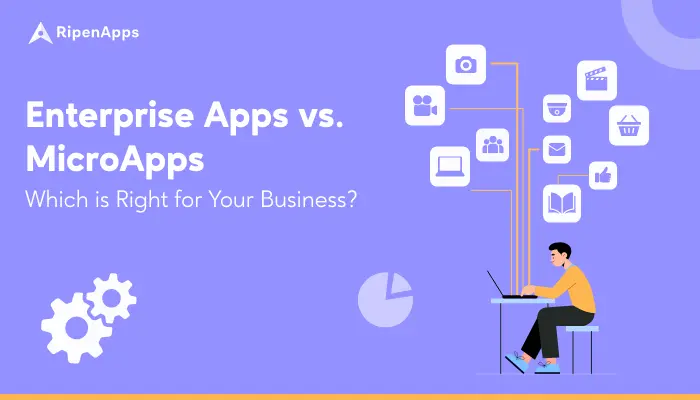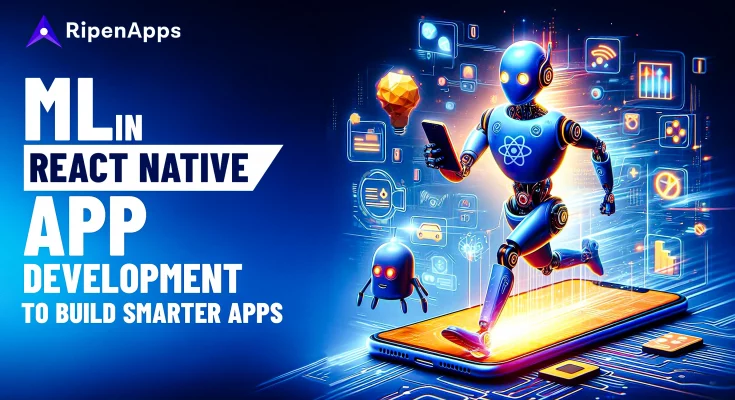Every business is in the running to streamline their operations, boost productivity, and engage customers to build a sustainable business. According to researchers, 87 percent of businesses believe digital will disrupt their industry. This is why all businesses are looking forward to embedding digital solutions in the form of enterprise apps or micro apps.
However, it is not an easy choice for businesses to decide between Enterprise apps and micro apps. And, this is what the below article aims to explain.
We will start by understanding enterprise apps and micro apps in detail. Later we will help you choose the right choice for your business by laying down two hypothetical case study scenarios. So let us dig into it.
Table of Contents
Enterprise Applications- An Extensive Solution
Enterprise Apps are extensive mobile applications designed to cover a wide range of functions and systems within an organization. You can call them super applications with vast features. They are often large, complex, and feature-rich, offering rich functionality to streamline various business processes. In the coming future, the enterprise’s application market size is projected to reach $527.40 billion by 2030.
Key Characteristics of Enterprise Apps
- Extensive Functionality: Enterprise Apps are designed to be a one-stop solution for various tasks. They often integrate multiple features like document management, communication tools, project management, and more.
- Vast Integration: These apps are usually tightly integrated with existing enterprise systems, such as Enterprise Resource Planning, Customer Relationship Management, and Human Resource Management systems.
- Higher Complexity: Enterprise Apps tend to be more complex to develop and maintain due to their wide range of functionalities and the need to ensure seamless integration with existing systems.
- Long Development Cycles: Developing and deploying Enterprise Apps can take considerable time due to their complexity and the need for extensive testing.
- High Customization: These apps are highly customizable to align with specific business processes and requirements.
- User Training: Users often require comprehensive training to make the most of these apps due to their extensive features.
- Higher Costs: Developing and maintaining Enterprise Apps can be expensive, requiring a significant investment of time and resources.
Enterprise Apps are ideal for large organizations with complex business processes. Additionally, it is most suitable if a business needs centralized solutions that cover various aspects of its operations. They provide a coordinated ecosystem for managing multiple workflows within the organization, enhancing efficiency and data integrity. However, for complex requirements, you have to hire a dedicated tech app building company to deploy a successful and functional enterprise application.
Also Read: intelligent automation guide for enterprises
MicroApps- A More Focused Solution
MicroApps, on the other hand, are small, specialized mobile applications that address specific tasks or processes within an organization. They are designed to be lightweight, specific, and have a micro-targeted audience.
Key Characteristics of MicroApps
- Single Purpose: MicroApps are built to serve a single purpose or task, such as expense tracking, inventory management, or sales lead tracking.
- Simple & intuitive: These apps are designed to be simple and intuitive, with a minimalistic user interface focused on the core functionality.
- Quick Development: MicroApps have shorter development cycles compared to Enterprise Apps, making them more agile and responsive to changing business needs.
- Limited Integration: While they can integrate with other systems, MicroApps typically have less extensive integration requirements than Enterprise Apps.
- Cost Effective: Developing and maintaining MicroApps tends to be more cost-effective, as they require fewer resources and have a faster time-to-market.
- Low Training Requirement: MicroApps are often intuitive to use, requiring minimal user training.
- Higher Flexibility: Organizations can deploy multiple MicroApps to target specific pain points or tasks without the complexity of an all-encompassing Enterprise App.
MicroApps are particularly suited for businesses looking to address specific pointers or streamline microprocesses. Make sure to find a leading digital transformation company that can provide the required agility for your application.
Which is Right For Your Business- Enterprise Apps vs MicroApps?
The choice between Enterprise Apps and MicroApps depends on various factors, including the nature of your business, your goals, and your existing technology infrastructure. However, there are some pointers that you can analyze to make the right choice between enterprise and micro application.
- Business Complexity: If your organization has complex, interconnected processes that require centralized management, an Enterprise App may be the better choice.
- Specific Pain Points: If you have isolated pain points or tasks that need improvement, MicroApps can provide quick, targeted solutions.
- Budget Constraints: If budget is a significant concern, consider starting with MicroApps, as they often require lower initial investments helping you to plan your budget for app development more efficiently.
- Time-to-Market: If you need a solution quickly, MicroApps can be developed and deployed faster as compared to Enterprise apps.
- Integration Requirements: Evaluate your requirements and analyze if the existing workflow integration is complex or not. If extensive integration is required, an Enterprise App might be more suitable as micro apps are limited. Also, ensure the choice of your platform to determine if you want to go with iOS app development or Android
- User Training: Consider the training and onboarding requirements of your users. If simplicity and minimal training are essential, MicroApps may be the way to go.
- Scalability: Think about how your app requirement may evolve as your business grows. If you anticipate a need for additional functionalities and scalability, an Enterprise App may provide a more future-proof solution than micro applications.
It’s worth noting that some organizations choose a hybrid approach, combining both Enterprise Apps and MicroApps. The goal of such an approach is to strike a balance between comprehensive solutions and targeted efficiency improvements.
Enterprise Apps vs MicroApps- Case Studies
Now that we have understood enterprise and micro apps in detail it is time to look at the real-life example. Here are two hypothetical scenarios to further illustrate the choice between Enterprise Apps and MicroApps for your business.
A Large Enterprise Corporation case
A multinational corporation with complex operations, multiple departments, and a wide range of business processes is looking to streamline its operations. Here the enterprise app approach is the best choice for the corporation.
The Enterprise App Approach
- Develops a comprehensive Enterprise App that integrates with existing ERP, CRM, and HRM systems.
- The app covers finance, human resources, project management, and supply chain management.
- Requires extensive development and testing, taking around 12 months to deploy.
- Offers extensive customization options for different departments.
- Users undergo in-depth training to use the app effectively.
- The app requires a substantial investment but provides a centralized solution for all operations.
A Medium-Sized E-commerce Company case
An e-commerce company is looking to improve its order fulfillment process, which has become inefficient due to manual tracking and communication. Here the micro app will be the best choice.
MicroApp Approach
- Develops a MicroApp specifically for order tracking and fulfillment.
- The app is simple, focusing solely on order management.
- Development and testing take about three months to complete.
- Integration is minimal, connecting only to the e-commerce platform and the inventory system.
- Users find the app intuitive and require minimal training.
- The development cost is significantly lower compared to an Enterprise App.
In the above scenarios, the large enterprise corporation benefits from an Enterprise App to manage its complex operations, while the medium-sized e-commerce company uses a MicroApp to address specific challenges efficiently.
Wrapping Up
Choosing between Enterprise Apps and MicroApps depends on your organization’s unique requirements, goals, and challenges. Enterprise Apps provide comprehensive solutions for complex operations, while micro apps offer focused, agile solutions for specific tasks or pain points. By carefully evaluating your business needs, integration requirements, budget, and scalability, you can make an informed decision about which approach is right for your organization.
Additionally, in some cases, a combination of both Enterprise Apps and MicroApps may provide the best of both worlds, allowing you to balance comprehensive functionality with targeted efficiency improvements. Ultimately, the choice should align with your business strategy and drive your organization toward greater efficiency and success in the digital world.










 India
India USA
USA Australia
Australia Canada
Canada UK
UK UAE
UAE